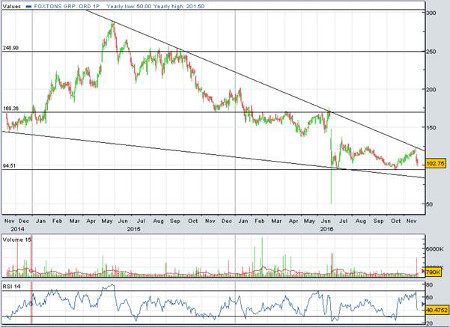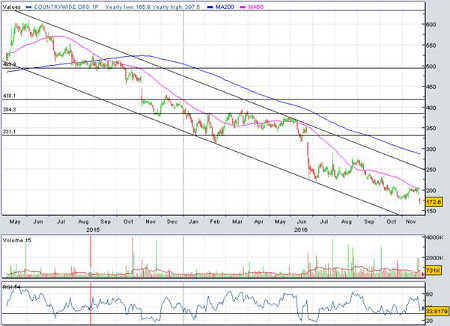Is estate agent sell-off overdone?
24th November 2016 13:27
by Lee Wild from interactive investor
Share on
Philip Hammond's first Autumn Statement as chancellor has attracted plenty of criticism, not least for the Office for Budget Responsibility's (OBR) estimate that Brexit will cost the UK up to £60 billion. There's some scepticism around infrastructure spending, help for housebuilders and the deficit, too, but it's new rules on estate agent fees that's had most impact on equity markets.
The government proposes to ban letting agents from charging tenants' fees for things like reference, credit and immigration checks, and for drawing up tenancy agreements. This can be a huge cost to renters, especially in London hotspots. According to the Citizens Advice Bureau, the average charge to cover admin services is about £337.
David Cox, managing director of the Association of Residential Letting Agents (ARLA), called Hammond's crackdown "a crowd-pleaser" that will not help tenants long-term. He might be right, but the chancellor seemed pretty committed.
"In the private rental market, letting agents are currently able to charge unregulated fees to tenants," Hammond told a packed House. "We have seen these fees spiral, often to hundreds of pounds. This is wrong. Landlords appoint letting agents and landlords should meet their fees. So I can announce today that we will ban fees to tenants as soon as possible."
His plan had been leaked overnight Tuesday, so big players like had plunged well before Hammond stood up at 12:38 Wednesday. The London-based firm is down over 16% over the past two days.
Clearly, the likes of and had a sleepless night, both issuing trading updates first thing Thursday.

Relisted by private equity owner Oaktree Capital in 2013 at 350p, Countrywide's share price responded with a further 13% dive to 169p, adding to yesterday's 5% slide. The UK's largest integrated property services group - it does lettings, sales, mortgage broking etc - warned Thursday that stamp duty changes and the EU referendum had already hurt business.
"Transaction levels are currently running significantly below 2015," it said, adding that volumes for 2016 will be down 6% on last year, and that 2017 could be even worse. That will dump 2016 cash profit at the bottom of market expectations.
Chief executive Alison Platt hardly mentioned the chancellor and letting agents' fees, saying only that she "looks forward" to working with government through the consultation process.

AIM-listed Belvoir was more specific. "At this stage, Belvoir cannot fully predict the likely financial impact on the results for the year ended December 2017 and beyond," it said. "Based on the group's experience following a similar decision in Scotland in 2012, however, the board anticipates that mitigating action should be possible over time and indeed it should be noted that no franchisees were lost in Scotland as a consequence."
It predicts about 10% of income derived by franchisees is from fees to tenants, and that the impact on total group gross profit will be less than 8%.
Elsewhere, AIM-listed online estate agency won a reprieve after claiming the chancellor's action would not have any "meaningful impact" on the business. Upfront fees are already pretty low and it does not charge renewal fees. We'll hear more at the interim results on 5 December.
What the experts say
First of all, it's well worth recapping what technical analyst and Interactive Investor contributor Alistair Strang predicted here a month ago, with Countrywide's share price at 202p. I quote:
"From a software perspective, [Countrywide] currently needs to better 280p to cancel a logical target at 170p, this being a point around which some sort of bounce can be hoped."
And today's session will be hugely important if Alistair's often reliable software is right.
"The problem comes if the share closes a session below 169p, as apparently the final bottom should be at 127p," he warns. Keep 'em peeled.
UBS spells out the risks
"Our initial approximate sensitivity analysis suggests that while there is a meaningful [operating profit/EBIT] impact the share price reactions could be overdone," suggests UBS analyst Heidi Richardson.
"We estimate that without mitigating action the change could impact Foxtons FY17 EBIT by -4% to -12%, and Countrywide FY17 EBIT by -2% to -7%. However it could be lower if fees are transferred to landlords/rents rise. For Savills we expect limited impact as UK residential transactions make up just 9% of sales including fees from selling homes."
Richardson still rates Foxtons and Savills a 'buy', and remains 'neutral' on Countrywide.
According to market data site SharePad, Foxtons now trades on about 16 times forward earnings and yields around 6%. Countrywide trades on just 7 times earnings and yields about 6.5%.
This article is for information and discussion purposes only and does not form a recommendation to invest or otherwise. The value of an investment may fall. The investments referred to in this article may not be suitable for all investors, and if in doubt, an investor should seek advice from a qualified investment adviser.